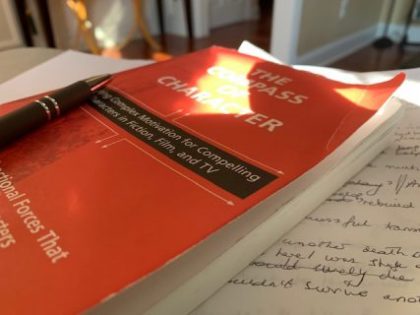
L’il Red Compass
Every once in a while a book, movie or message from the universe sings to my heart. Over the last month I’ve been reading a little red book called the ‘The Compass Of Character’ by master storyteller and writing instructor, David Corbett. OK… so maybe it’s not that little. Oh, and I keep a highlighter handy because I’m highlighting every second sentence—sparkles like gold!
You see, David speaks more than truths when it comes to the art of writing fiction.
David doesn’t just discuss how to create fictional characters. He doesn’t talk about interviewing or spending time with your characters—something I’ve never understood. He discusses how to dig deep for the depth that turns a character on page to a person. A human. An individual.
Why do two people who endure the same experience behave differently? For example…
B and C were the victims of a tragedy that happened over 20 years ago. C got past the tragedy and moved on. B didn’t. Why can’t B get over the trauma like C did. And how did C get over that incident in the first place?
Or… Why do two people who are living in the same household (siblings) have totally different wants and goals? What causes a desire in the first place? How intense is a desire for each person? And what happens if s/he doesn’t get what s/he wants?
I’ve learned that people behave based on an inner need to protect, hide or mask something embedded deep within their core. That’s just one perspective to comprehend human behavior. David explores these elements and many many more in ‘The Compass of Character’. His exercises will make you stop. Think. Flex those brain muscles. And intently watch the people around you.
Nobody is born evil. Nobody is born a goody-two shoes either. Your experiences, the way you’ve been molded while growing up and the people around you influence how you think and who you are. As writers, those are huge considerations when crafting characters. You see, characters are not just people on paper. They are living, breathing entities with hearts and minds of their own. At least for me they are.
I’ve tried to force my characters to do something that I want or that I feel works for the story. The result? My characters disagreed and walked off the page. Now do I say the story’s not working or my characters are acting out of character? The consequence? I left my characters to act of their own accord, the story took surprise twists and turns and I was turning pages to see ‘what happens next’.
Which is what happened when I read and am still reading ‘The Compass of Character’. I’m beginning to understand why my characters don’t act logically. You see, real people don’t. I understand why my characters pursue the goals they do, get derailed and pursue something else instead. You see, real people do. What I’m also learning is how to dig deeper into my current work-in-progress to better understand what my characters want, the hurdles they’ll overcome to meet their objectives and what risks they’ll take if they have to.
Just like real people.
To all you writers out there ‘The Compass of Character’ isn’t another how-to craft book. It’s a deep dive into the psychology of human thinking and behavior, an exploration of why despite the logical pathway and processes wired in our brains, emotions stampede and override our sanity–-our characters’ sanity, I mean, Is there any rationale behind why we do what we do?
If not, why not? Because we are human? And that’s what real people do? Irrational things?
 Why do we writers need to know all of this?
Why do we writers need to know all of this?
Perhaps, we don’t need to know. Perhaps we want to know.
Or maybe it’s just me who wants to know.
You see, I’m not just creating characters on the page. I’m creating living, breathing people and the only way to make them leap off the page is to find their inner compass. Their north. And in turn find my own.
So what’s your inner compass? How will you find north?
STORY MANTRA WITH DAVID CORBETT!




